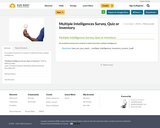
An excellent inventory for students to determine their multiple intelligences.
- Subject:
- Education
- Material Type:
- Activity/Lab
- Assessment
- Homework/Assignment
- Date Added:
- 09/07/2018
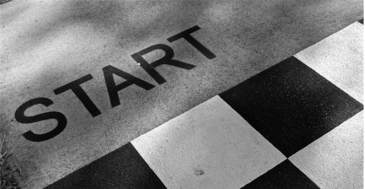
This collection features resources to support the use of readiness assessments.
Any assessment that examines a student's readiness to learn is considered a readiness assessment. These assessments may look at academic readiness (math, reading, writing), skills readiness (21st century skills, learning styles, etc.), or attitudinal (grit, growth mindset) readiness. They may include diagnostic or learning/attitude inventories. The resources in this collection will help you to determine the readiness of your students in a variety of areas including Math, English Language Arts, 21st Century Skills, Growth Mindset, Learning Style, Personality Type, Creativity Style, etc.
Learner Profiles can provide a great deal of information about student readiness. Be sure to visit the Learner Profile Collection (https://resourcebank.ca/curated-collections/35) for more resources and to examine what should be done with Learner Profiles for students. Information can be found in that collection for teaching students to study and learn based on their learner profile. It is essential that once the learner profiles are created that they are revisited regularly with students to help them do their best learning. Learner Profliles can be a tool to develop classroom community, empathy as well as metacogntion for students.
Please note that readiness assessments should be redone at the start of each school year, as our skills, learning styles and personalities can evolve and shift as we develop and have new experiences as both children and adults.

An excellent inventory for students to determine their multiple intelligences.
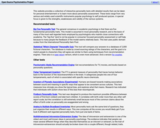
A wealth of online personality tests for free. These may be some of the tests you wish to consider doing with older students as part of their learner profiles. Consider doing the Jungian Scales/Myers Briggs. The brain dominance, temperament quiz and memory test are also very interesting.
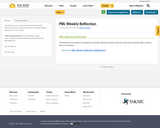
The following is an example of a template for a weekly reflection students could use if they were working on PBL or Genius Hour, or any project.
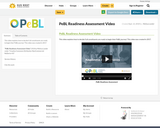
This video explains how to decide if all constituents are ready to begin their PeBL journey! This video was created in 2017.
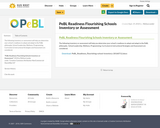
The following inventory or assessment will help you determine your school's readiness to adopt and adapt to the PeBL philosophy. School Leadership, Wellness, Programming, Curriculum & Instructional Strategies and Assessment are considered.
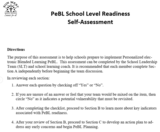
The purpose of this assessment is to help schools prepare to implement Personalized electronic Blended Learning PeBL. This assessment can be completed by the School Leadership Team (SLT) and school learning coach. It is recommended that each member complete Section A independently before beginning the team discussion.In reviewing each section:1. Answer each question by checking off “Yes” or “No”. 2. If you are unsure of an answer or feel that your team would be mixed on the item, then circle “No” as it indicates a potential vulnerability that must be revisited. 3. After completing the checklist, proceed to Section B to learn more about key indicators associated with PeBL readiness. 4. After your review of Section B, proceed to Section C to develop an action plan to address any early concerns and begin PeBL Planning.
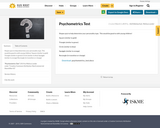
Shapes quiz to help determine your personality type. This would be good to with young children!
Square (similar to gold)
Triangle (similar to green)
Circle (similar to blue)
Squiggle (similar to orange)
Rectangle (in transition or change)

*Math assessment materials
*Reading K-6 assessment materials
K-6
Select "Acadience Reading K-6 (Digital Administration" from the left menu; and "Benchmark Materials" from the right menu. - Then Select Your Grade's Materials .
7-9
Select "Acadience Reading 7-8 (Digital Administration" from the left menu; and "Benchmark Materials" from the right menu. - Then Select Your Grade's Materials .
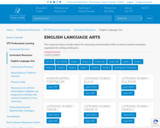
Rubrics for reading are provided for Grades 1 to 12.

Please keep in mind that you can also use the paper copies of this to administer. If you are using the paper versions, you will need to adjust your administration accordingly.
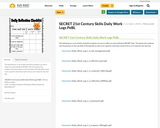
The following are a set of daily checklists students can use to reflect on each individual SECRET skill. The log has the students rate themselves on the sub skills of the big skill as well as set a goal for what they need to focus on to improve the next day.
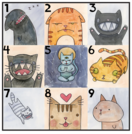
These check ins are a quick way to get your finger on the pulse of your classroom and respond accordingly!
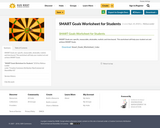
SMART Goals are: specific, measurable, attainable, realistic and time bound. This worksheet will help your student set and achieve SMART Goals.
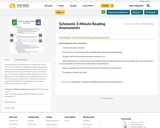
How to administer the assessments:
• Literally only takes 5 minutes
• Four choices for each grade (student passage page and teacher recording page)
• Student reads for 60 seconds and teacher records errors
• After 60 seconds you read the story to the student (while they follow along) to remove any difficulties s/he may had had in word recognition or fluency that could hamper comprehension
• Remove passage from student and ask what they remember from the passage
• Prompting is allowed, but noted
...
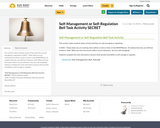
This activity makes students aware of how well they are self-managing or regulating.
It ASKS : "Today when you are working, there will be a clock or timer on the SMARTBoard. At random intervals, you will hear a beep or a bell. When you hear the sound, reflect on your behaviour. Are you self-managing?"
Students complete the chart attached to measure their growth and ability to self-manage or regulate.
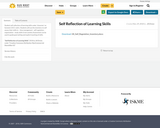
Student self reflection of learning skills under 'character' on Sunwest 21CC rubric.
Students will use the inventory to self assess their skills in:
- time management
- self regulation
- organization
- study skills & test anxiety
Assessment can be used to guide goal setting and explicit teaching of skills.
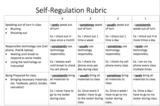
This is a rubric that can be used to Assess students Self-Regulation in the classroom.
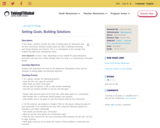
In this lesson, students consider the value of setting goals for themselves and for their community, thinking critically about the idea of defining community and shared interests and concerns. This is an introduction to the concepts that underlie the Millennium Development Goals.
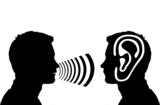
The Kindergarten Phonological Assessment Screener asseses:blending syllables into wordssegmeting words into syllablesisolating initial phonemesisolating final phonemesblending phonemessegmenting words into phonemes
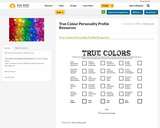
True Colour Personality Profile Resources